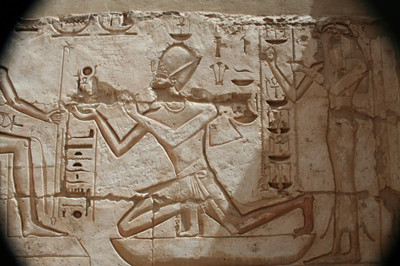And so warfare plays really a key role in, if you like, the consolidation of the Egyptian sense of their own nationhood.
因為我們可以說,戰爭是真的扮演了關鍵的作用,幫助埃及人進一步鞏固自我的建國意識。
It's a discouragingly familiar strategy. You win hearts and minds at home by focusing on the threats from abroad, but the weapons that you need to crush the enemy can come in handy when you're dealing with domestic opponents as well. The political rhetoric of foreign aggression is backed up by very brisk policing at home.
這是一種令人沮喪的熟悉伎倆。當把所有注意力集中到對抗外敵上,你能夠贏取國內的民心;然而在需要的場合上,用來粉碎敵人的武器也可以直接施用于自己國內的有反抗情緒的老百姓身上。對外侵略的政治修辭總有相當犀利的國內政策來支持。
The apparatus of the modern state had been forged. And the enduring consequences were artistic as well as political. Only power of this order could organise the enormous building projects that these early pharaohs embarked on.
現代國家這種機器建造起來了,產生了藝術上與政治上的持久性后果。也只有這種秩序的力量,能組織起人力建設起這些早期法老下令開工的那些偉大建設工程。
Den's elaborate tomb with granite shipped from hundreds of miles away, and the later, even grander pyramids, were possible only because of the extraordinary power the Egyptian pharaohs could exercise over the minds and the bodies of their subjects.
國王丹那宏偉的墳墓上的共崗巖,都來自于數百英里外的地區。后來的金字塔墓更加是氣勢恢弘。這一切,都是因為埃及法老在埃及民眾心目中,擁有可以操縱他們身心、超同尋常的力量。
In the next programme, I'll be looking further east, beyond Sinai to Mesopotamia-modern-day Iraq. Two rivers there, not one, and not one great unitary state like Egypt, but competing groups of rich city states. But the same problems confront the rulers: how do you control these large, prosperous-but always turbulent-populations? And in part at least, they came up with the same answer: force.
在下期的節目中,我去探索更加東方的地方,跨過西奈半島,到達美索不迷米亞——現代的伊拉克。那里流淌著不止一條,而是兩條河流,那里也沒有一個如同埃及一樣偉大的統一中央王國,而且是散布著彼此競爭的富裕城市國家。然而所有的統治者都面臨著同樣的問題:究竟應該如何控制好這些人口眾多而繁榮,共同又動蕩不安的民族?至少從某方面而言,他們也采同了相同的措施:權力。












